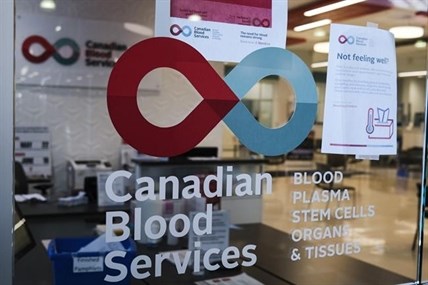
A blood donor clinic pictured at a shopping mall in Calgary, Alta., Friday, March 27, 2020. Scientists have been poring over COVID-19 data in an effort to better understand the still unknown aspects of the virus. The key to unlocking some of those mysteries could be in our blood.
Image Credit: THE CANADIAN PRESS/Jeff McIntosh
April 15, 2020 - 5:00 AM
Scientists have been poring over COVID-19 data in an effort to better understand the still unknown aspects of the virus.
The key to unlocking some of those mysteries could be in our blood.
Dr. Danuta Skowronski, the epidemiology lead at the BC Centre for Disease Control, says antibody research — like the blood-based studies currently happening in her lab — have some major advantages.
Among them is discovering how many people actually had the virus, even if they never showed symptoms.
"Antibodies stick around after the infection — it's like a signature of having been infected — so serosurveys (blood serum tests) can identify the true infection rates," Skowronski said in a phone interview with The Canadian Press.
"We are recognizing more and more that there are not only mild infections that may be missed, but also asymptomatic infections that are being missed. And that may be contributing to the overall infection rate in the community."
Skowronski, who's also a clinical professor at UBC in Vancouver, said the current nasal swab test for COVID-19 "picks up the genetic remnants of the virus during or just very, very shortly after infection has occurred."
"And relying on that can skew our overall understanding of what the infection rate is, who is being infected and how severe it is," she added.
The blood serum studies, meanwhile, are based on antibody detection.
Antibodies are blood proteins the body produces days or weeks after fighting an infection. Skowronski described them as the immune system's response to an invading pathogen, "with the role to neutralize the virus so that it can't replicate."
Antibody tests are also used in detecting things like HIV, hepatitis, Lyme disease, lupus and many other diseases.
But how long do coronavirus antibodies last, and how long could they provide any type of immunity? Those are questions Skowronski and her colleagues are trying to determine.
Skowronski's lab, which also did antibody research with H1N1 in 2009, collected blood samples from 1,000 people in the Lower Mainland — what she deemed "likely the most affected area of the province" — in early March.
The blood samples were taken from all age ranges in an effort to discover how prevalent the virus was within that segment of the population.
Including samples from kids is important, Skowronski said, because their typically milder infections may cause them to be overlooked.
"Our understanding of the age distribution of the cases may be warped by the current virological-based testing," she said.
Similar COVID-19 serological studies or assays are happening across Canada and worldwide.
Skowronski says the important step now is to "validate" them, and do them again during another phase of the pandemic.
"We want to make sure that we're not missing some of those antibodies if present," she said. "And the plan is for us to repeat that snapshot.
"We took a snapshot in early March and we have plans to do serial snapshots to be able to derive the infection rate over the course of potential successive waves of the pandemic, much like we did in 2009."
Serological surveys are happening only in labs right now — at least in Canada — for research purposes. Skowronski said Health Canada has not yet approved serological assays for Canadians outside the lab studies.
The World Health Organization says on its website that it does "not recommend the use of antibody-detecting rapid diagnostic tests for patient care" based on current data.
The United States seems to be taking a different approach.
More than 70 companies in the U.S. have signed up to sell what they're calling antibody tests in recent weeks, according to U.S. regulators. The hope is that these rapid tests, which collect a finger-prick of blood on a test strip, could determine when to ease public restrictions by identifying people who have developed some immunity to the virus.
The tests, when validated, can be particularly useful in the creation of an eventual vaccine, what Skowronski called "the ultimate goal" of the serological research.
Scientists in her lab are currently looking at blood samples from confirmed COVID-19 cases to determine immune response at various points after the infection has cleared.
"We can see the kind of antibody that they are developing, and that will be very important because we can then look at the targets that the antibodies are going after on the virus," Skowronski said. "Those would then be the kinds of targets that we want to replicate in a vaccine.
"We want the vaccine to try to induce antibody (similar) to what the body is naturally developing when you're infected with the virus."
Skowronski believes a vaccine likely won't be available for at least 12 to 18 months, a trajectory which she said is already accelerated.
"The typical timeline would not be months. It would be years, decades even for a vaccine," she said. "Obviously, when faced with this sort of threat, the timelines are compressed, but you can't leap over really critical pieces of information like how well it induces immunity, how well that translates into preventing infections, and very important, the safety of the vaccine.
"You may be able to shorten the timelines with a real concerted effort, but you cannot skip over those really important steps."
— With files from The Associated Press
This report by The Canadian Press was first published April 14, 2020.
News from © The Canadian Press, 2020